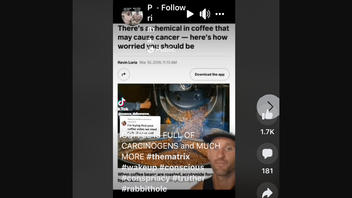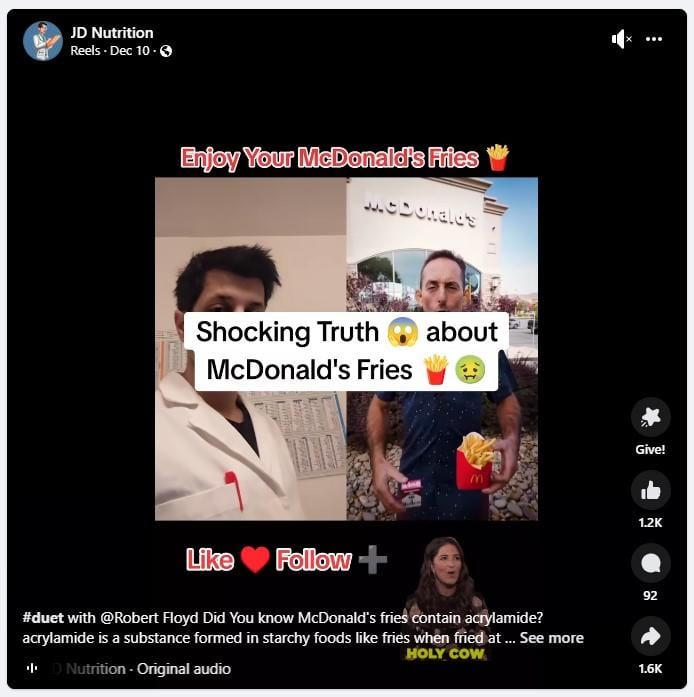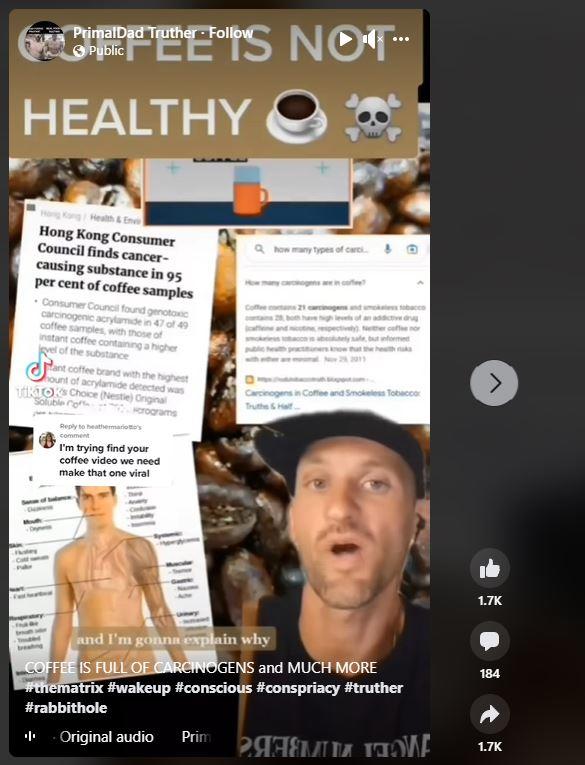STORY UPDATED: check for updates below.

Does regularly consuming a cup of java or eating french fries increase the odds of developing cancer, thanks to the chemical acrylamide in the brew? No, that's not true: Acrylamide was first discovered in some cooked foods in 2002 and studies to this point have found no link between acrylamide and cancer, the National Cancer Institute reports. Medical experts have found no conclusive evidence of a cancer risk from coffee in general, and have instead found lower risk of certain cancers.
The claim appeared in a video on Facebook on January 19, 2023. Its caption read:
COFFEE IS FULL OF CARCINOGENS and MUCH MORE#thematrix#wakeup#conscious#conspriacy
#truther#rabbithole
Eleven seconds into the video, the narrator, an unidentified man, points at a collection of screenshots and states:
Here are just a few of the cancer-causing chemicals found in your coffee. If you don't believe me, Google 'acrylamide.'
This is what the post looked like on Facebook at the time of writing:
(Source: Facebook screenshot taken on Fri Jan 27 19:24:05 2023 UTC)
Another video originally posted by @robertfloydmd on TikTok on November 2, 2023, was reposted by the page JD Nutrition on Facebook with this caption:
#duet with @Robert Floyd Did You know McDonald's fries contain acrylamide? acrylamide is a substance formed in starchy foods like fries when fried at high temperatures and has linked to increased cancer risk. Minimal consumption of these types of foods is recommended.
#mcdonaldsfries #acrylamide #mcdonalds #mcdonaldssecrets #fastfood #deepfriedfood #deepfried #healthtips #holisticnutritionist

(Source: Facebook screenshot taken on Mon Dec 11 21:46:11 2023 UTC)
The text captions on the french fry video and the narration of Robert Floyd refer to acryline, an industrial styrene and acrylic chemical used for coatings and paints. This, confusingly, does not match the term in the text caption: acrylamide, the natural substance produced by certain foods when cooked. The FDA has a FAQ on acrylamide that reviews what is currently understood about this substance. The FDA writes:
Q: Should I stop eating foods that are fried, roasted, or baked?
No. FDA's best advice for acrylamide and eating is that consumers adopt a healthy eating plan, consistent with the Dietary Guidelines for Americans (2015-2020), that emphasizes fruits, vegetables, whole grains, and fat-free or low-fat milk and milk products; includes lean meats, poultry, fish, beans, eggs, and nuts; and limits saturated fats, trans fats, cholesterol, salt (sodium) and added sugars.
The coffee and french fry videos provided no peer-reviewed evidence by recognized medical experts to back up their claims.
The public affairs director at the Sidney Kimmel Comprehensive Cancer Center at Johns Hopkins emailed Lead Stories on January 26, 2023, with links to what it termed "two authoritative sources of information."
The first link is a summary of coffee risks by the American Institute for Cancer Research, which states on its website that it was founded "to increase awareness of the diet-cancer link." The organization's summary notes:
- There is probable evidence that coffee DECREASES the risk of:
- Endometrial and liver cancers
and:
- Limited evidence suggests that coffee may DECREASE the risk of:
- Mouth, pharynx, larynx and skin cancers, though more research is needed to determine if these are cause and effect associations.
The second link is to a 2016 study by the International Agency for Research on Cancer, the cancer agency of the World Health Organization. The study reports that 23 scientists evaluated "the carcinogenic effect of drinking coffee" and "found no conclusive evidence" that such an effect exists.
Though the study found that "drinking very hot beverages probably causes" cancer of the esophagus, that connection depends on the temperatures, "rather than the drinks themselves," then-IARC Director Dr. Christopher Wild wrote.
Coffee is one of the major food sources of the chemical acrylamide, which the Facebook video claims causes cancer. The media office at the National Cancer Institute, part of the National Institutes of Health, emailed Lead Stories on January 26, 2023, a link to a fact sheet on "Acrylamide and Cancer Risk," that said:
A large number of epidemiologic studies (both case-control and cohort studies) in humans have found no consistent evidence that dietary acrylamide exposure is associated with the risk of any type of cancer.
Lead Stories previously has debunked claims that toothpaste, COVID-19 test swabs and Kinder Joy candies, among other products, also cause cancer. Those fact checks can be found here.
Updates:
-
2023-12-11T23:10:37Z 2023-12-11T23:10:37Z This article was updated on December 11, 2023, to add information about french fries, the date acrylamide was first discovered in some cooked foods, the video on TikTok and the information from the FDA.


















